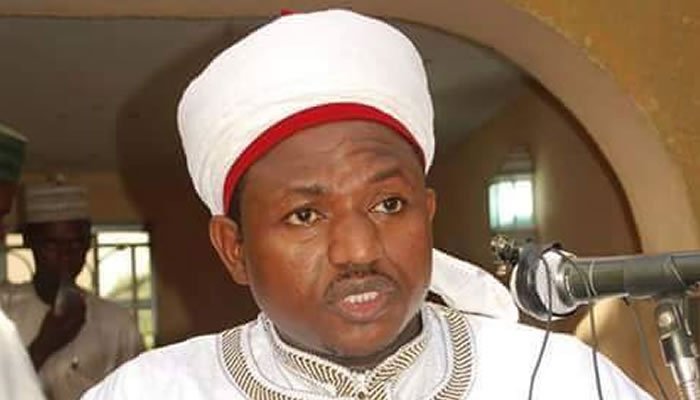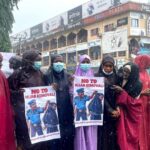A Kano State Upper Sharia Court on Thursday sentenced an Islamic cleric, Abduljabbar Kabara to death by hanging after he was found guilty of a four-count charge of blasphemy filed against him by the Kano State government.
Kabara was arrested at his home in Kano and arraigned on 16 July 2021, before an Upper Sharia Court at ‘Kofar Kudu’ situated at the Emir’s palace.
Daily Trust highlights some major events that happened which landed the cleric the death sentence.
Accusing Abduljabbar of blasphemy
It can be said that the issue of Abduljabbar Nasir Kabara started after some Kano State scholars from different ideologies (Kadiriyya, Tijjaniyya and Izala) wrote a letter of complaint to the Kano State Government about what they saw as insulting to the Prophet stating that the scholar did so in his lectures at his Ashahabul Kahfi mosque.
Man, 49, caught bathing with blood in Ogun river
Blasphemy: Things to know about Kano cleric sentenced to death by hanging
Also, the scholars made a tape that contained some of Abduljabbar’s lectures at his gatherings which was submitted to the government.
As a result of this, on February 5, 2021, the Kano State Government, after receiving an order from the court, stopped Malam Abduljabbar Kabara from preaching and closed his Ashabul Kahfi mosque.
In addition, the government banned the airing of the scholar’s lectures in the state’s media.
Abduljabbar’s debate with scholars
The measures taken by the government did not sit well with Abduljabbar as he called on the government to organize a debate between him and the scholars who thought there were flaws in his teachings.
On February 2, 2021, the government accepted the scholar’s request. On the 8th of July, the government announced that the debate would be held on the 10th of July.
The scholars chosen to debate against Sheikh Kabara were: Dr Rabiu Umar Rijiyar Lemo, Malam Masud Hotoro, Malam Abubakar Mai Madattai, and Malam Kabir Bashir Kofar Wambai.
At the end of the debate, the presiding judge who is also the director of the Centre for Islamic Civilization and Interfaith dialogue, Bayero University Kano, Professor Salisu Shehu declared that after hearing from both sides Malam Kabara had failed to respond appropriately to questions raised on claims he had made during his preaching sessions.
The judge in his final address revealed that all questions raised and directed to Abduljabbar were not answered and that the sheikh had kept derailing from what he claimed to have been an agreed pattern.
On his part, Abduljabbar accused the Kano State Government of denying him enough time to make statements and not giving him information on the issues to be discussed before the day.
Abduljabbar in court
On the 16th of July, the Kano Government charged the scholar to the Shari’a High Court at Kofar Kudu.
Abduljabbar was arraigned on July 28, 2021, however, the government lawyers led by Saida Suraj (SAN) asked the court to adjourn the case. The court on August 18, 2021, adjourned the case again and the scholar’s lawyers led by Saleh Bakaro accused the government of slowing the process of the case.
The court ordered his mental health examination
On the 3rd of September, when charges presented by the plaintiffs were read to Abduljabbar, he mumbled, causing the court to order his brain and ears to be tested at the hospital to determine his health status.
When the court sat on the 17th of September, it was presented with the results of the brain and ear tests done on him, which showed that the scholar was healthy.
From then his lawyers withdrew from the case and Abduljabbar accused them of forcing him not to speak in the previous session because the court said he was sick.
However, in their response, his lawyers, through Barristter Rabi’u Muhammad, denied the accusations he made against them and threatened to sue him if he did not withdraw his statement.
On October 2, Abduljabbar’s new lawyers led by Muhammad Umar asked the court to grant him bail, but the court rejected their request.
His lawyers withdrew
On the 11th of November, the new lawyers of Abduljabbar Kabara withdrew from the case causing a delay in the hearing of the plaintiffs’ evidence.
On November 10, he got a new lawyer, Mohammed. O. Ambali (SAN), but he asked to be given time to review the case.
He has no lawyer to defend him
On May 13, the court asked the Legal Aid Council to provide Abduljabbar with a lawyer because he did not have one to defend him.
On June 2, the Legal Aid Council announced to the court that it would not defend Abduljabbar because he had the ability to hire a lawyer on his own and his case was not on the list of cases that the agency was dealing with.
On the same day, the court ordered Barrister Dalhatu Shehu Usman to defend Abduljabbar.
On June 9, Abduljabbar Kabara’s new lawyer, Barrister Dalhatu Usman, appeared before the court. It was on that day that the tapes of Abduljabbar’s lectures were first listened to and the court ordered that the tapes be given to the prosecutors for review.
Abduljabbar defended himself
On June 23, Abduljabbar began to defend himself and his lawyers asked the court to release him because according to them, he did not commit the crime he was accused of and the charges against him were not legal.
Bribing issues
On the 29th of September, his lawyer, Barrister Dalhatu, abstained from the court session. Abduljabbar accused the lawyer of taking N2 million from him to give to the judge so he could acquit him.
At that time, the judge denied accepting the money and challenged Barrister Dalhatu to come forward and give his evidence that he gave him the money.
However, in his response, Barrister Dalhatu denied the allegations as baseless and unfounded.
It was on that day that the judge declared that the hearing of the case had been completed and announced the date of judgement.
Sentencing
On Thursday, the Islamic cleric was convicted and sentenced to death by hanging for blasphemy.

 Join Daily Trust WhatsApp Community For Quick Access To News and Happenings Around You.
Join Daily Trust WhatsApp Community For Quick Access To News and Happenings Around You.


